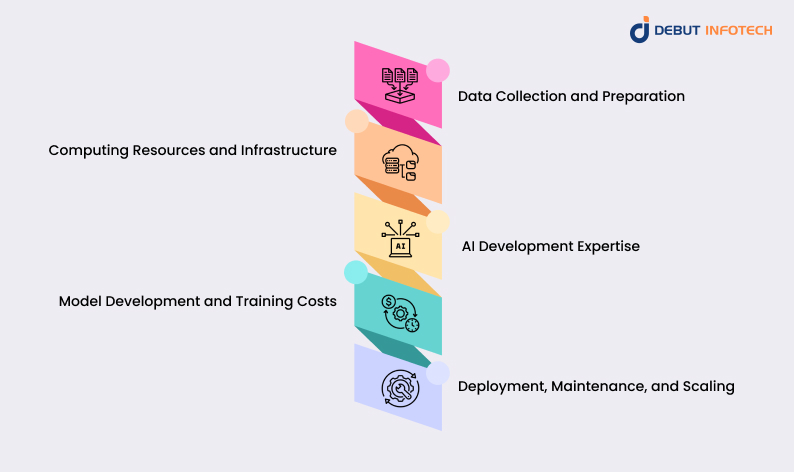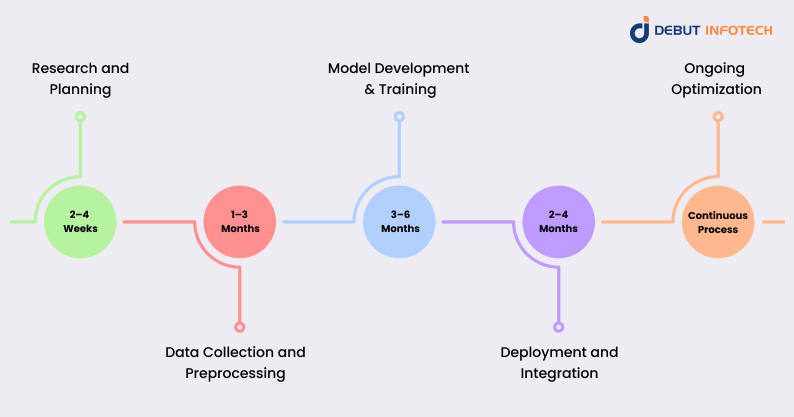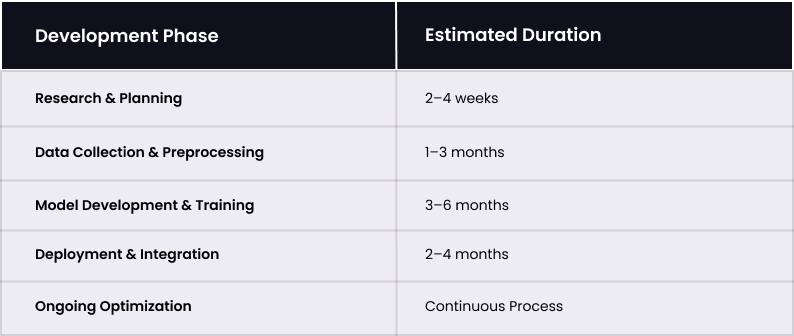Table of Contents
Generative AI Development: Cost & Time Factors Explained
February 27, 2025

February 27, 2025
The rise of Generative AI Development has revolutionized industries by enabling machines to generate text, images, music, and even code with remarkable accuracy. Businesses rapidly integrate generative AI into their workflows, from chatbots to AI-generated content, to enhance efficiency, automation, and customer engagement. However, before investing in this technology, one of the most crucial factors companies consider is the cost of generative AI development and the time required to build a functional AI system.
Developing a generative AI solution is a complex process that involves choosing the right generative AI frameworks, training generative AI models, and ensuring seamless Generative AI Integration Services. The cost and time depend on various factors such as data availability, computational power, development expertise, and model complexity. This article will provide a detailed breakdown of the cost of generative AI, the time required for development, and the key factors influencing these aspects.
Discover How Much Generative AI Costs
Use our Generative AI Cost Calculator to estimate the investment needed for your AI solution. Our generative AI consultants will guide you whether you’re a startup or an enterprise.
Key Factors Affecting the Cost of Generative AI Development
Generative AI Development costs are highly variable, depending on multiple technical and business factors. While some companies can leverage pre-trained models to reduce expenses, others may require custom AI solutions that demand extensive data training, computing power, and expert development teams. Additionally, AI integration, deployment, and long-term maintenance further influence overall costs.
Beyond the initial development, businesses must also account for AI model retraining, security updates, and regulatory compliance, all of which can contribute to recurring costs. Companies looking to optimize their budget should carefully evaluate whether pre-built generative AI models, fine-tuning existing frameworks, or developing custom AI solutions best align with their goals.

Below are the primary factors that influence development costs:
1. Data Collection and Preparation
Generative AI models require large datasets for training, which may be publicly available, proprietary, or require manual labeling. Costs in this phase include:
- Purchasing high-quality datasets – Ranges from $1,000 to $100,000+ depending on the domain.
- Data cleaning and preprocessing – Requires generative AI consultants or data scientists, adding to labor costs.
- Compliance and privacy considerations – Ensuring compliance with GDPR, HIPAA, or other regulations may incur legal and security expenses.
2. Computing Resources and Infrastructure
Training generative adversarial networks (GANs) and text-to-speech models requires significant computational power. The two primary options for businesses are:
- Cloud-based AI solutions – Platforms like AWS, Google Cloud, and Azure charge based on GPU/TPU usage, typically costing $5,000–$100,000 per month for large-scale projects.
- On-premise infrastructure – Setting up dedicated AI hardware (e.g., NVIDIA A100 GPUs) can cost $50,000–$500,000+ depending on storage and computational needs.
3. AI Development Expertise
The choice between hiring generative AI developers in-house, working with an AI development company, or outsourcing to generative AI development companies significantly affects the cost.
- In-house AI team – Salaries for AI engineers range from $100,000 to $300,000 per year.
- Outsourcing to AI firms – Project costs range from $50,000 to $500,000, depending on scope and complexity.
- Freelancers or consultants – typically charge between $50–$300 per hour, depending on experience.
4. Model Development and Training Costs
Developing generative AI models from scratch is resource-intensive. Costs depend on:
- Model complexity – Simple models cost $10,000–$50,000, while advanced adaptive AI development solutions can exceed $500,000.
- Training time – Training large AI models may take weeks or months, leading to higher cloud computing expenses.
5. Deployment, Maintenance, and Scaling
Once the AI model is trained, additional costs include:
- Integration into business applications – Costs range from $10,000–$100,000 for software development.
- Scaling for enterprise use – Advanced Generative AI Integration Services may require additional cloud resources, security enhancements, and compliance measures.
- Ongoing maintenance and updates – Typically 15-30% of the initial annual development cost.
Estimating the Cost: Generative AI Cost Calculator
Understanding the cost of Generative AI Development is crucial for businesses planning to integrate AI-driven solutions. Since development costs can vary widely based on factors such as model complexity, data processing needs, cloud computing expenses, and developer expertise, businesses often use generative AI cost calculators to estimate the overall budget.
Key Factors Influencing Generative AI Costs
Several critical components determine how much generative AI costs:
- Data Processing Costs – AI models require vast amounts of high-quality data for training. Costs can arise from data acquisition, preprocessing, labeling, and storage, especially for businesses dealing with proprietary or sensitive data.
- Cloud Computing Requirements – The computational power needed to train and deploy AI models significantly affects costs. Businesses must consider:
- Cloud-based AI solutions (AWS, Google Cloud, Azure) vs. on-premise GPU/TPU infrastructure.
- Real-time AI model inference vs. batch processing for cost efficiency.
- AI Model Training Duration – The longer it takes to train a model, the higher the computational costs. Large-scale generative AI models, such as text-to-speech or image-generation networks, often require weeks or months of intensive computing power.
- Developer & Infrastructure Expenses – Hiring generative AI developers, partnering with AI development companies, or consulting with generative AI consultants can significantly impact costs. Other expenses include:
- Custom AI model development vs. fine-tuning pre-trained models.
- Ongoing AI model optimization and maintenance costs.
- Security and compliance measures for AI deployment.
Estimated Cost Ranges for Generative AI Development
The cost of building a Generative AI model depends on the project scope and business requirements. Here’s a breakdown:
- Small-Scale AI Solution – $10,000–$50,000
- Suitable for startups and small businesses.
- Typically involves fine-tuning existing generative AI frameworks.
- Limited computational power and moderate data processing needs.
- Mid-Sized AI Application – $50,000–$200,000
- Includes Generative AI Integration Services for mobile/web applications.
- It may require training on proprietary datasets.
- Higher infrastructure and cloud computing costs.
- Enterprise-Grade AI Model – $200,000–$1 million+
- Custom-built AI models for large-scale automation, decentralized apps (dApps), or enterprise solutions.
- Heavy data processing, high-performance AI tech stack, and security compliance.
- Ongoing AI model retraining and adaptation based on future AI trends.
Using a Generative AI Cost Calculator
To get a precise cost estimate, businesses can use AI providers’ generative AI cost calculators, which analyze factors such as:
- Type of AI model (text, image, speech, or video generation).
- Training and inference costs (based on computing resource consumption).
- Model customization level (fine-tuning vs. full-scale AI development).
- Ongoing AI support and maintenance costs.
Businesses can optimize AI investments by leveraging cost estimation tools and partnering with an experienced Generative AI Development Company while ensuring efficient and scalable solutions.
How Long Does Generative AI Development Take?
The development timeline for Generative AI depends on several factors, including model complexity, data availability, computational resources, and integration requirements. A simple AI-powered application may take a few months to develop, optimize, and deploy, while a highly sophisticated generative AI model designed for enterprise use can take over a year.

Below is a breakdown of the key phases involved in Generative AI Development, along with estimated timelines for each stage.
1. Research & Planning (2–4 Weeks)
Businesses need a clear strategy before creating AI models. The research and planning phase defines objectives, assesses feasibility, and selects the right generative AI frameworks.
Key Steps:
- Identifying the specific generative AI use case (text, image, video, or speech generation).
- Assessing the feasibility of using existing generative AI models versus developing a custom solution.
- Choosing the appropriate AI tech stack, including frameworks like TensorFlow, PyTorch, or proprietary AI solutions.
- Estimating how much generative AI costs based on infrastructure and development needs.
- Deciding whether to hire generative AI developers or collaborate with an AI development company.
2. Data Collection & Preprocessing (1–3 Months)
Data is the foundation of AI, and gathering high-quality, diverse datasets is crucial for effective model training. The time required for this phase depends on the dataset size, cleaning efforts, and labeling requirements.
Key Steps:
- Collecting proprietary or publicly available datasets based on the AI use case.
- Cleaning and structuring raw data to remove inconsistencies, biases, and duplicate entries.
- Labeling and annotating data for machine learning training (may involve human or automated annotation).
- Ensuring compliance with data privacy regulations such as GDPR, CCPA, or HIPAA.
- Enhancing training datasets using generative adversarial networks (GANs) for improved AI learning.
3. Model Development & Training (3–6 Months)
This is the most critical phase, where AI engineers and generative AI consultants design, train, and refine the model. The duration of this phase depends on model complexity, dataset size, and computing power.
Key Steps:
- Selecting and customizing generative AI frameworks like GANs, transformers, or diffusion models.
- Training the AI model using high-performance GPUs or TPUs to process vast datasets.
- Fine-tuning hyperparameters and adjusting training methods for optimal performance.
- Running multiple iterations to improve model accuracy and reduce biases.
- Conducting rigorous testing to benchmark the model against industry standards.
This phase may take six months or more due to the extensive training and testing required for large-scale models like text-to-speech models, AI image generators, or code-generation systems.
4. Deployment & Integration (2–4 Months)
Once the model is trained and optimized, it must be integrated into business applications or deployed as a standalone AI service. This phase ensures that the AI system functions efficiently in real-world environments.
Key Steps:
- Developing APIs or embedding the model within existing applications.
- Optimizing AI models for cloud, on-premise, or edge computing deployment.
- Implementing scalability measures to handle real-time AI processing demands.
- Ensuring security protocols to protect AI models from adversarial attacks.
- Conducting compliance checks to align with industry standards and regulations.
Deployment time varies based on integration complexity. For example, a chatbot powered by generative AI may be deployed within a few weeks. In contrast, an enterprise-grade AI development company may take months to integrate AI across large-scale systems.
5. Ongoing Optimization (Continuous Process)
Generative AI is not a one-time implementation—it requires continuous monitoring, refinement, and retraining to remain relevant and effective.
Key Steps:
- Regularly monitoring model performance to detect potential drifts or biases.
- Updating AI models with fresh training data to maintain accuracy.
- Scaling computing resources based on real-world demand and AI workload.
- Collecting user feedback and iterating improvements to enhance AI outputs.
- Conducting security updates and regulatory compliance checks as AI trends evolve.
Since adaptive AI development is shaping the future of AI, businesses must stay current with generative AI trends to enhance model efficiency and competitiveness.
Final Timeline Breakdown: How Long Does Generative AI Development Take?

On average, a small-scale AI-powered application can take 4–6 months, while an enterprise-grade AI model may require 12–18 months from inception to deployment.
Businesses looking to accelerate this timeline can partner with experienced generative AI development companies, leverage pre-trained models, and use automated AI tools to streamline processes. However, investing additional time in model refinement leads to better long-term performance, scalability, and cost-efficiency for organizations requiring custom AI solutions.
The Future of AI and Generative AI Trends
As generative AI trends continue to evolve, businesses can expect:
- Advancements in adaptive AI development – AI models continuously learn from real-world interactions.
- More efficient generative adversarial networks (GANs) – Reducing computing power costs.
- Expansion of text-to-speech models – Enhancing human-like AI interactions.
- Increased AI accessibility – More affordable and scalable AI solutions for startups and SMEs.
With ongoing research and innovation, AI development companies will continue refining Generative AI Integration Services, making AI adoption faster and more cost-effective.
Build Your Generative AI Solution Today
Looking for cost-effective and efficient Generative AI Integration Services? Partner with Debut Infotech, a leading AI development company, to bring your AI vision to life.
Conclusion
The cost of generative AI development varies widely based on data needs, infrastructure, development expertise, and project complexity. While small-scale projects may cost $10,000–$50,000, enterprise-level solutions can exceed $1 million. Similarly, development timelines range from a few months to over a year, depending on the scope and customization required.
Businesses looking to leverage Generative AI Development should work with experienced generative AI development companies or hire generative AI developers to ensure cost-efficient and scalable solutions. As AI advances, companies that invest in the right AI strategies will stay ahead in an increasingly AI-driven world.
Frequently Asked Questions
The cost of generative AI development varies based on the complexity of the model, dataset requirements, and computational infrastructure. Small-scale AI solutions can range from $10,000–$50,000, while enterprise-grade AI models may exceed $1 million. Cloud computing, AI expertise, and ongoing maintenance also impact the overall cost. A generative AI cost calculator can help estimate expenses based on specific project requirements.
The development timeline for generative AI models depends on factors such as data preparation, training time, and integration complexity. A basic AI model may take 3–6 months, whereas a large-scale, enterprise-level AI system could require 12–18 months. This includes research, data preprocessing, model training, deployment, and optimization.
Several factors determine the cost of generative AI, including:
1. Data acquisition and preprocessing – High-quality labeled data increases costs.
2. Computational resources – Cloud-based GPU/TPU services or on-premise AI hardware.
3. Development expertise – Costs vary between in-house AI teams, generative AI development companies, and freelancers.
4. Model complexity – Advanced generative adversarial networks (GANs) and adaptive AI development solutions require more investment.
5. Integration and maintenance – Ensuring AI models work within existing applications and remain up-to-date.
The decision depends on budget, expertise, and project scope. Hiring an experienced AI development company or generative AI consultants can accelerate development while ensuring high-quality results. In-house development may be cost-effective for organizations with AI expertise but can lead to longer timelines and higher operational costs.
Generative AI has applications across multiple industries, including:
1. Content generation – AI-powered text, image, and video creation.
2. Text-to-speech models – Enhancing voice assistants and automated support.
3. Healthcare – AI-generated medical imaging and drug discovery.
4. Finance – AI-driven market predictions and automated trading.
5. Customer service – AI chatbots for personalized user interactions.
The future of AI is rapidly evolving, with key trends including:
1. Advancements in generative AI frameworks – More efficient AI architectures.
2. Improved natural language processing (NLP) – Enhancing AI-generated content accuracy.
3. AI ethics and responsible AI – Addressing bias and regulatory challenges.
4. Adaptive AI development – AI systems that learn and improve over time.
5. Integration with blockchain and Web3 – AI-powered decentralized applications.
Businesses can use a generative AI cost calculator provided by AI service providers to determine the cost of generative AI. These tools estimate expenses based on computing needs, data processing requirements, and development complexity. Consulting with a generative AI development company can also help outline a cost-effective AI strategy.
Talk With Our Expert
USA
2102 Linden LN, Palatine, IL 60067
+1-703-537-5009
[email protected]
UK
Debut Infotech Pvt Ltd
7 Pound Close, Yarnton, Oxfordshire, OX51QG
+44-770-304-0079
[email protected]
Canada
Debut Infotech Pvt Ltd
326 Parkvale Drive, Kitchener, ON N2R1Y7
+1-703-537-5009
[email protected]
INDIA
Debut Infotech Pvt Ltd
C-204, Ground floor, Industrial Area Phase 8B, Mohali, PB 160055
9888402396
[email protected]




Leave a Comment